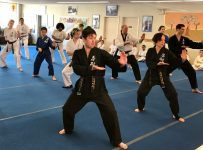Students often find their studies to be challenging at one time or other. For most, the temptation becomes to focus all their energies and attention on their course work and leave out everything else.
Unfortunately, going about it in this way is counter-productive and can hurt your academic performance instead of improving it.
One of the things that are encouraged for students is participation in sports. So how do sporting activities support education? Here are five ways in which sports help students academically.
1. Health
Everything begins with good health. With failing health, simple everyday tasks become difficult or impossible to think.
Think about it, when in bed sick, attending your classes is often the last thing you can think of; it’s recommended that individuals get 75 minutes of rigorous exercises or 150 minutes of moderate exercises per week. These are the optimal workout timings that ensure the body functions as it should. Most sports will include some practice and playtime that will meet this requirement partially or wholly.
When you are physically healthy, you can attend to your studies as you should.
2. Self-esteem and Confidence
Playing a sport will have wins and losses and other little achievements along the way. But, whatever the outcome, a student that plays sports gets to enjoy the encouragement and motivation from their coach and teammates.
A motivated student with this kind of support often has high self-esteem and confidence in themselves than an isolated student who thinks the world is against them. This confidence bleeds into one’s academic life, and a student is likelier to bring this attitude to the classroom; this helps propel their educational objectives forward.
3. Self-Assessment
Sports teaches students how to assess their strengths and weaknesses and depend on their teammates when need be.
Self-assessment is helpful in both sports and academics, as it teaches students that it’s okay to seek help when needed. The same way a student with an injury might need more support from teammates to play well is the same way a student might need help with math or another subject in class.
The key to success in both scenarios is recognizing when you require support and asking for it.
In the field, this can be fundamental to winning a game; in the classroom, it is essential to one’s academic performance.
4. Enhances teamwork
Most sports are team-based; each team member has to work collaboratively with others towards a central goal.
This kind of teamwork does more than creating bonds and healthy relationships; it teaches sacrifice, cooperation, effective communication and conflict resolution.
These are skills students need in the classroom for group projects and collaborative working. The success of these impacts how well a student will fair in group tasks. Outside of school, these skills will remain relevant as the workplace is becoming increasingly collaborative.
5. Discipline
Discipline is vital in sports; this goes for everything from working out, a diet plan for your spot, making it to practice and so on.
Sportsmen and women also have to listen to their coach and learn to take instruction.
While discipline might be challenging initially, students soon get the hang of it and begin to enjoy its benefits. One of these is that they find it easier to carry this same discipline to their school life; this helps with many processes, including creating and sticking to a study schedule.
Discipline is one way of ensuring that they give enough time and dedication to their studies. As a result, such students begin to see a gradual improvement in their academic performance.
You can view the original article HERE.






























